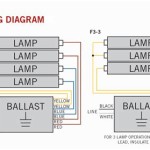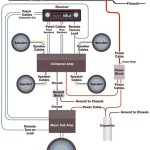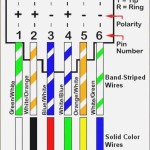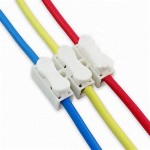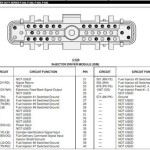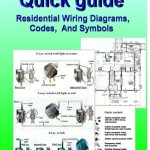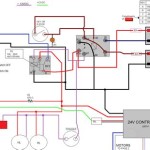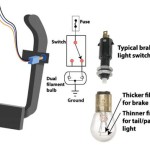A trailer wiring adapter is a device that allows the electrical system of a tow vehicle to connect with the electrical system of a trailer. This enables the trailer to receive power from the tow vehicle, and to operate its lights, brakes, and other electrical components. For example, a 7-pin to 4-pin trailer wiring adapter converts a 7-pin connector on a tow vehicle to a 4-pin connector on a trailer, allowing the trailer to receive power and ground, as well as activate its turn signals and brake lights.
Trailer wiring adapters are essential for safe and legal towing, as they ensure that the trailer’s electrical system is properly connected to the tow vehicle’s electrical system. They prevent electrical issues that could cause the trailer’s lights or brakes to malfunction, which could lead to accidents. A key historical development in trailer wiring adapters was the introduction of standardized connectors. This simplified the process of connecting trailers to tow vehicles, and made it easier to ensure that the electrical systems of the two vehicles were compatible.
This article will delve into the different types of trailer wiring adapters available, their features and benefits, and how to choose the right adapter for your towing needs.
Trailer wiring adapters are essential for safe and legal towing, as they ensure that the trailer’s electrical system is properly connected to the tow vehicle’s electrical system. They come in different types and with various features, so it’s important to understand the key aspects of trailer wiring adapters to choose the right one for your towing needs.
- Connector type: The type of connector on the adapter must match the type of connector on the tow vehicle and trailer.
- Number of pins: The number of pins on the adapter determines the number of electrical functions that can be supported.
- Wire gauge: The wire gauge of the adapter determines the amount of current that can be carried.
- Length: The length of the adapter should be long enough to reach from the tow vehicle to the trailer.
- Features: Some adapters have additional features, such as built-in circuit protection or LED indicators.
- Quality: The quality of the adapter is important for ensuring a reliable connection and long service life.
- Compatibility: The adapter must be compatible with the specific tow vehicle and trailer models.
- Price: The price of the adapter should be considered when making a purchase.
By considering these key aspects, you can choose the right trailer wiring adapter for your towing needs. This will ensure that your trailer’s electrical system is properly connected to your tow vehicle’s electrical system, allowing for safe and legal towing. For example, if you have a newer tow vehicle with a 7-pin connector and an older trailer with a 4-pin connector, you would need a 7-pin to 4-pin trailer wiring adapter.
Connector type
The connector type on a trailer wiring adapter is critical because it ensures a proper electrical connection between the tow vehicle and the trailer. If the connector types do not match, the electrical systems of the two vehicles will not be able to communicate, which could lead to safety hazards such as malfunctioning lights or brakes. For example, if a tow vehicle has a 7-pin connector and the trailer has a 4-pin connector, a 7-pin to 4-pin trailer wiring adapter is necessary to establish a compatible connection.
There are various types of connector types used for trailer wiring adapters, including flat 4-pin, round 7-pin, and RV blade 7-pin. Each type is designed for a specific application, and it is important to choose the correct adapter for your towing needs. Using an adapter with the incorrect connector type can result in electrical problems or even damage to the electrical systems of the tow vehicle or trailer.
Understanding the importance of connector type when choosing a trailer wiring adapter is essential for safe and reliable towing. By ensuring that the connector types on the adapter match the connector types on the tow vehicle and trailer, you can establish a proper electrical connection that will allow the trailer’s lights, brakes, and other electrical components to function properly.
Number of pins
The number of pins on a trailer wiring adapter is critical because it determines the number of electrical functions that can be supported between the tow vehicle and the trailer. Each pin on the adapter corresponds to a specific electrical function, such as powering the trailer’s lights, brakes, or turn signals. Therefore, the number of pins on the adapter directly affects the functionality of the trailer’s electrical system.
For example, a 4-pin trailer wiring adapter supports only the most basic electrical functions, such as powering the trailer’s tail lights and brake lights. On the other hand, a 7-pin trailer wiring adapter supports a wider range of electrical functions, including powering the trailer’s turn signals, brake lights, tail lights, running lights, and electric brakes.
Understanding the relationship between the number of pins on a trailer wiring adapter and the number of electrical functions that can be supported is essential for choosing the right adapter for your towing needs. By selecting an adapter with the correct number of pins, you can ensure that all of the trailer’s electrical components will function properly and safely.
In summary, the number of pins on a trailer wiring adapter is a critical component that determines the functionality of the trailer’s electrical system. By understanding the connection between the number of pins and the number of electrical functions that can be supported, you can make informed decisions when choosing a trailer wiring adapter for your towing needs.
Wire gauge
Understanding the wire gauge of a trailer wiring adapter is crucial for ensuring the safe and efficient operation of your trailer’s electrical system. The wire gauge, measured in American Wire Gauge (AWG), determines the thickness of the electrical wires within the adapter, which directly affects the amount of current that can be carried. Choosing an adapter with the appropriate wire gauge is essential to prevent overheating, voltage drop, and potential electrical hazards.
- Conductor size: The wire gauge determines the size of the electrical conductors within the adapter, which affects the amount of current that can flow through the wires. Thicker wires with a lower AWG number can carry more current than thinner wires with a higher AWG number.
- Voltage drop: The wire gauge also influences the voltage drop along the length of the adapter. Thinner wires with a higher AWG number have a greater resistance, leading to a higher voltage drop. This can result in reduced power and performance of the trailer’s electrical components.
- Heat dissipation: The wire gauge affects the ability of the adapter to dissipate heat generated by electrical current. Thicker wires with a lower AWG number have a larger surface area, allowing for better heat dissipation and preventing overheating.
- Safety: Using an adapter with an appropriate wire gauge is essential for safety. Oversized wires can handle higher currents without overheating, reducing the risk of electrical fires or damage to the trailer’s electrical system.
Choosing the correct wire gauge for your trailer wiring adapter depends on the specific electrical requirements of your trailer. Heavier trailers with more electrical components, such as electric brakes, refrigerators, or air conditioners, will require an adapter with a lower AWG number to handle the increased current draw. By selecting an adapter with the appropriate wire gauge, you can ensure the reliable and safe operation of your trailer’s electrical system, preventing potential hazards and ensuring a smooth towing experience.
Length
When selecting a trailer wiring adapter, the length of the adapter is a crucial factor to consider. An adapter that is too short can create a taut connection, putting strain on the electrical components and potentially leading to damage. Conversely, an excessively long adapter can introduce unnecessary slack, creating a tripping hazard and potentially becoming entangled with other objects. Understanding the various aspects of the adapter’s length is paramount for ensuring a safe and effective connection between the tow vehicle and the trailer.
- Vehicle and Trailer Dimensions: The length of the adapter should accommodate the distance between the tow vehicle’s electrical outlet and the trailer’s electrical input. Consider the size and configuration of both vehicles to determine the appropriate length.
- Adapter Placement: The desired placement of the adapter on the tow vehicle and trailer may influence the required length. Factors such as accessibility, protection from the elements, and routing of the adapter cable should be taken into account.
- Maneuverability: The length of the adapter should allow for sufficient maneuverability of the trailer, especially during tight turns or reversing. An excessively long adapter can restrict movement and increase the risk of damage.
- Safety Considerations: The length of the adapter should prioritize safety. A properly sized adapter will minimize tripping hazards and prevent the cable from becoming entangled with other objects, reducing the likelihood of accidents or injuries.
By carefully considering these aspects, you can choose a trailer wiring adapter with the optimal length for your specific towing needs. This will ensure a secure connection, prevent unnecessary strain or damage, and contribute to the safe and efficient operation of your towing system.
Features
Within the realm of trailer wiring adapters, various features can enhance their functionality and safety. These features range from built-in circuit protection to LED indicators, offering additional benefits beyond the basic electrical connection between tow vehicles and trailers.
-
Circuit Protection:
Built-in circuit protection safeguards the electrical system from damage caused by short circuits or overloads. This feature utilizes fuses or circuit breakers to automatically disconnect the circuit, preventing potential fires or equipment damage.
-
LED Indicators:
LED indicators provide visual cues for proper operation and troubleshooting. They can indicate power supply, connection status, and potential electrical issues, allowing users to quickly identify and address any problems.
-
Magnetic Base:
Magnetic bases enable adapters to attach securely to metal surfaces, ensuring a stable connection and reducing the risk of accidental disconnection. This feature is particularly useful in harsh conditions or off-road environments.
-
Weather Resistance:
Weather-resistant adapters are designed to withstand exposure to moisture, dust, and extreme temperatures. This ensures reliable performance in all weather conditions, preventing corrosion and maintaining electrical integrity.
These features enhance the safety, functionality, and convenience of trailer wiring adapters. Circuit protection safeguards against electrical hazards, while LED indicators provide real-time feedback on the electrical system’s status. Magnetic bases and weather resistance ensure reliable operation in various environments. By choosing an adapter with appropriate features, users can optimize their towing experience and ensure the safe and efficient operation of their trailer’s electrical system.
Quality
In the context of trailer wiring adapters, quality encompasses various aspects that contribute to their reliability, durability, and overall performance. High-quality adapters are essential for maintaining a stable electrical connection between the tow vehicle and the trailer, ensuring the proper functioning of lights, brakes, and other electrical components. Neglecting quality can lead to unreliable connections, electrical issues, and premature failure, compromising safety and convenience during towing operations.
-
Materials and Construction:
The materials used in the adapter’s construction play a crucial role in its durability and resistance to wear and tear. Look for adapters made from robust materials such as durable plastics, corrosion-resistant metals, and high-quality conductors to ensure longevity in harsh conditions.
-
Connector Design:
The design of the connectors on the adapter is critical for maintaining a secure and reliable electrical connection. Precision-engineered connectors with proper pin alignment and secure locking mechanisms prevent loose connections, voltage drop, and electrical arcing, ensuring optimal current transfer.
-
Weather Resistance:
Exposure to moisture, dust, and extreme temperatures can degrade the adapter’s performance and lifespan. Choose adapters with weather-resistant seals, protective coatings, and corrosion-resistant terminals to withstand harsh environmental conditions and maintain reliable operation in all types of weather.
-
Warranty and Customer Support:
A comprehensive warranty and responsive customer support from the manufacturer indicate confidence in the product’s quality and durability. Look for adapters backed by a substantial warranty period and a reputable brand with a proven track record of providing excellent customer service.
Prioritizing quality when selecting a trailer wiring adapter is a wise investment, ensuring a reliable connection, long service life, and peace of mind during your towing adventures. High-quality adapters minimize the risk of electrical problems, reduce maintenance costs, and enhance the overall safety and efficiency of your towing system.
Compatibility
Compatibility is paramount when selecting a trailer wiring adapter. An incompatible adapter can lead to electrical problems, safety hazards, and reduced functionality. Compatibility encompasses various aspects, including:
-
Connector Type:
The connector type on the adapter must match the connector type on the tow vehicle and trailer. Common connector types include flat 4-pin, round 7-pin, and RV blade 7-pin. Mismatched connectors can prevent a proper electrical connection.
-
Pin Configuration:
The pin configuration refers to the arrangement and functionality of the pins within the connector. Adapters must have the correct pin configuration to ensure that the electrical signals are correctly transmitted between the tow vehicle and trailer.
-
Voltage and Amperage:
The adapter must be compatible with the voltage and amperage requirements of the tow vehicle and trailer. Using an adapter with an insufficient voltage or amperage rating can lead to overheating, damage to electrical components, or reduced performance.
-
Vehicle-Specific Features:
Some tow vehicles and trailers have specific electrical features or modules that require compatible adapters. For example, certain vehicles may require adapters with built-in resistors or signal converters to function properly.
Ensuring compatibility between the trailer wiring adapter, tow vehicle, and trailer is essential for safe and reliable towing. Choosing an incompatible adapter can result in electrical issues, safety hazards, or reduced functionality, compromising the overall towing experience. Therefore, it is crucial to verify compatibility before selecting and using a trailer wiring adapter.
Price
When selecting a trailer wiring adapter, considering the price is a crucial aspect that can impact the overall towing experience. The price of the adapter is directly related to the quality, features, and compatibility offered. Understanding the connection between price and trailer wiring adapters is essential for making informed decisions and ensuring a safe and reliable towing system.
The price of a trailer wiring adapter is primarily influenced by the materials used in its construction, the complexity of its design, and the brand reputation. Higher-priced adapters typically incorporate durable materials, precision engineering, and advanced features, resulting in enhanced performance and longevity. Conversely, budget-friendly adapters may compromise on certain aspects to achieve a lower price point.
Real-life examples demonstrate the impact of price on trailer wiring adapters. A basic 4-pin flat adapter, suitable for simple lighting functions, can be purchased at a lower price compared to a more sophisticated 7-pin round adapter with built-in circuit protection and LED indicators. The higher price of the 7-pin adapter reflects the additional functionality and safety features it offers.
Understanding the connection between price and trailer wiring adapters empowers consumers to make informed choices. By considering the intended use, required features, and towing needs, buyers can determine an appropriate price range for the adapter. Striking a balance between affordability and quality ensures a satisfactory towing experience without compromising safety or reliability.
In summary, the price of a trailer wiring adapter is a significant factor to consider when making a purchase. Higher-priced adapters generally offer better quality, more features, and improved compatibility, while budget-friendly options prioritize affordability. Understanding this connection allows buyers to make informed decisions based on their specific towing needs, ensuring a safe and reliable connection between their tow vehicle and trailer.










Related Posts

